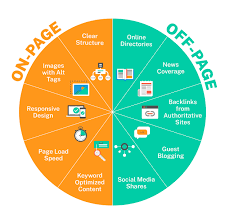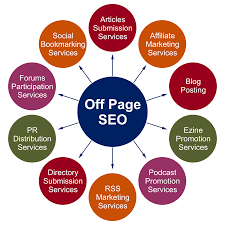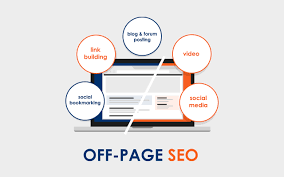Mastering Off-Page Optimization Techniques for SEO Success
The Power of Off-Page Optimization in SEO
When it comes to search engine optimization (SEO), off-page optimization plays a crucial role in determining the online visibility and credibility of a website. While on-page optimization focuses on improving elements within the website itself, off-page optimization deals with factors external to the site that influence its rankings on search engine results pages (SERPs).
What is Off-Page Optimization?
Off-page optimization primarily revolves around building high-quality backlinks from reputable websites to your own site. These backlinks act as ‘upvotes’ from other sites, signalling to search engines that your content is valuable and trustworthy. The more authoritative and relevant the linking sites are, the more positively it impacts your site’s SEO performance.
The Importance of Off-Page Optimization
Off-page optimization is essential for several reasons:
- Enhanced Authority: Quality backlinks from authoritative sites can boost your website’s credibility and authority in the eyes of search engines.
- Improved Rankings: Backlinks are a key ranking factor for search engines like Google. The more high-quality backlinks you have, the higher your chances of ranking well for relevant keywords.
- Increased Traffic: As your site gains visibility through off-page strategies, you are likely to attract more organic traffic from users interested in your content or products/services.
- Brand Awareness: Building a strong off-page presence can help increase brand awareness and recognition among your target audience.
Effective Off-Page Optimization Strategies
To maximise the benefits of off-page optimization, consider implementing these proven strategies:
- Guest Blogging: Contribute high-quality guest posts to reputable websites in your industry with a link back to your site.
- Social Media Engagement: Actively engage with your audience on social media platforms to drive traffic and promote sharing of your content.
- Influencer Partnerships: Collaborate with influencers or industry experts to gain exposure and attract relevant backlinks.
- Broken Link Building: Identify broken links on other websites and offer your content as a replacement, earning valuable backlinks in return.
In Conclusion
In conclusion, off-page optimization is an indispensable component of a successful SEO strategy. By focusing on building quality backlinks and establishing a strong online presence beyond your website, you can significantly improve your rankings, drive organic traffic, and enhance brand visibility in the competitive digital landscape.
9 Essential Tips for Mastering Off-Page Optimisation
- Create high-quality and relevant backlinks from authoritative websites.
- Utilize social media platforms to promote your website and content.
- Guest blogging on reputable sites can help increase your website’s visibility.
- Submit your website to online directories and listings for better exposure.
- Engage in influencer marketing to reach a wider audience.
- Participate in forums and online communities related to your industry.
- Optimize your Google My Business listing for local SEO benefits.
- Encourage user reviews and testimonials to build credibility and trust.
- Monitor your off-page SEO efforts regularly and adjust strategies as needed.
Create high-quality and relevant backlinks from authoritative websites.
To enhance your website’s SEO performance, it is crucial to focus on creating high-quality and relevant backlinks from authoritative websites. By securing backlinks from reputable sources within your industry or niche, you not only signal to search engines the credibility of your content but also establish your site as a valuable resource in the online landscape. These quality backlinks act as endorsements that can significantly boost your site’s authority, improve its rankings on search engine results pages, and ultimately drive organic traffic to your website. Prioritising the acquisition of such backlinks through strategic outreach and relationship-building efforts can yield long-term benefits for your off-page optimization strategy.
Utilize social media platforms to promote your website and content.
Utilising social media platforms to promote your website and content is a highly effective off-page optimisation strategy. By actively engaging with your audience on platforms such as Facebook, Twitter, Instagram, and LinkedIn, you can increase brand visibility, drive traffic to your site, and encourage social sharing of your content. Sharing valuable and engaging posts, interacting with followers, and leveraging features like hashtags and influencer collaborations can help amplify your online presence and attract quality backlinks from social media sources. Embracing social media as part of your off-page optimisation efforts can result in improved search engine rankings and enhanced brand recognition in the digital landscape.
Guest blogging on reputable sites can help increase your website’s visibility.
Guest blogging on reputable sites is a highly effective off-page optimization strategy that can significantly enhance your website’s visibility and credibility. By contributing valuable content to established platforms within your industry, you not only showcase your expertise to a wider audience but also earn authoritative backlinks that signal trustworthiness to search engines. This proactive approach not only drives targeted traffic to your site but also strengthens your online presence, ultimately boosting your SEO performance and positioning your brand as a trusted authority in the digital landscape.
Submit your website to online directories and listings for better exposure.
Submitting your website to online directories and listings is a valuable off-page optimization strategy that can significantly enhance your online visibility. By listing your site on reputable directories, you increase the chances of reaching a wider audience and attracting more traffic to your website. These directories not only provide valuable backlinks but also serve as platforms for potential customers to discover your business and services. Overall, leveraging online directories and listings is a simple yet effective way to boost your website’s exposure and improve its search engine rankings.
Engage in influencer marketing to reach a wider audience.
Engaging in influencer marketing is a powerful strategy for off-page optimization that can significantly expand your reach and visibility online. By partnering with influencers who have a strong following in your industry or niche, you can leverage their credibility and influence to promote your brand to a wider audience. Influencers can help amplify your message, drive traffic to your website, and attract valuable backlinks from their own networks. This collaborative approach not only enhances your brand’s exposure but also establishes trust with potential customers through the endorsement of respected figures in the digital space.
Participate in forums and online communities related to your industry.
Engaging in forums and online communities relevant to your industry is a valuable off-page optimization strategy that can significantly boost your website’s SEO performance. By actively participating in discussions, sharing insights, and providing valuable contributions, you not only establish yourself as an authority in your field but also have the opportunity to build relationships with other industry professionals. Additionally, including links to your website in forum signatures or posts can generate quality backlinks and drive targeted traffic to your site, ultimately enhancing your online visibility and credibility within your niche.
Optimize your Google My Business listing for local SEO benefits.
To maximise the impact of off-page optimization, it is essential to optimise your Google My Business listing for local SEO benefits. By ensuring that your business information is accurate, up-to-date, and aligned with local keywords, you can enhance your visibility in local search results. A well-optimised Google My Business profile not only helps potential customers find essential information about your business quickly but also boosts your chances of appearing in the coveted ‘Local Pack’ results, increasing foot traffic and conversions.
Encourage user reviews and testimonials to build credibility and trust.
Encouraging user reviews and testimonials is a highly effective strategy in off-page optimization. By showcasing authentic feedback from satisfied customers, businesses can build credibility and trust with potential clients. Positive reviews not only enhance the reputation of a brand but also serve as social proof that influences purchasing decisions. Leveraging user-generated content in the form of testimonials can significantly boost a website’s authority and reliability in the eyes of both search engines and consumers, ultimately leading to improved online visibility and increased conversions.
Monitor your off-page SEO efforts regularly and adjust strategies as needed.
Monitoring your off-page SEO efforts regularly and adapting strategies as required is a fundamental tip to ensure the effectiveness of your search engine optimisation campaign. By keeping a close eye on the performance of your backlinks, social media engagements, and other off-page activities, you can identify what is working well and what needs improvement. This proactive approach allows you to stay ahead of algorithm changes, competitor actions, and evolving trends in the digital landscape, enabling you to make informed decisions that maximise the impact of your off-page optimisation efforts and drive sustainable results for your website.


